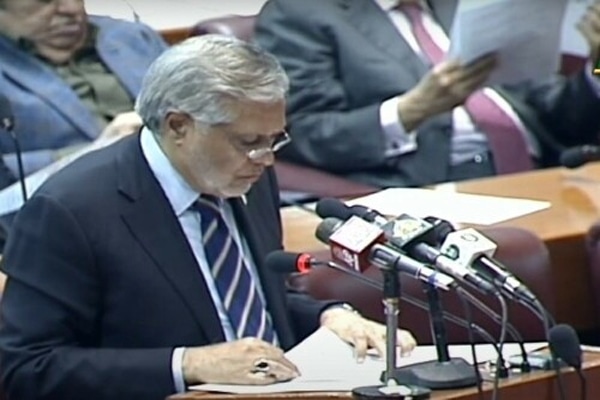ISLAMABAD: The Senate Standing Committee on Finance and Revenue has approved the Finance (Supplementary) Bill 2023, worth Rs170 billion, with a simple majority on Thursday.
The committee, under the chair of Senator Saleem Mandviwala, deliberated and discussed the recommendations on the money bill, which aimed to amend laws relating to taxes and duties.
The supplementary bill brings about an increase in general sales tax from 17 to 18%, besides increasing the Federal Excise Duty (FED) on sugary items, tobacco, airline tickets, marriage halls and cement.
While briefing about the tax measures suggested in the bill, Chairman FBR Asim Ahmed informed the committee that the government has increased sales tax on luxury imported items, including the ones that were banned last year.
Committee member Senator Mohsin Aziz suggested that the government should impose a ban on luxury imported items rather than increasing taxes as this tax will only encourage smuggling of these items.
Replying to a query by Senator Mohsin Aziz, State Minister for Finance and Revenue Dr. Aisha Ghaus Pasha commented that the ministry intended to put a ban on the import of luxury items but could not do so because of WTO restrictions. As far as smuggling is concerned, the FBR is in collaboration with Frontier Corps and other agencies to curb the smuggling of said items along the western border.
He also informed the committee that the government has also increased sales tax from 17 to 18 %, on the import of mobile phones where the value of the phone exceeds $ 200 but stays under $350. The same taxation increase was also enacted upon the other category of phones, the value of which is between $350-$500.
He added that sales tax on mobile phones worth more than $500 has been enhanced from 17 to 25 percent under the finance supplementary bill 2023, in line with the luxury nature of expensive variants.
Chairman FBR said that mobile phones costing more than $500 are classified as luxury items and are subject to a flat 25% sales tax. Besides this, makeup, cosmetics, imported vehicles, imported water, sanitary fittings, home appliances, crockery, footwear, imported furniture, chocolate, perfume, cornflakes, and bathroom accessories are also included in the luxury category.
Senator Mohsin Aziz, a member of Pakistan Tehreek-e-Insaf, expressed his concern about the imposition of Rs 170 billion additional taxation measures, questioning whether it was just taxes or in fact a Rs 520 billion mini-budget.
He argued that the government should explain why it took so long for the bailout deal and make public how many taxes were imposed due to pressure from the IMF.
Senator Mohsin Aziz also questioned the law, under which the FBR issued SROs with regards to the increase in general sales tax, and FED on cigarettes.
In response, the State Minister for Finance Dr Aysha Ghous Pasha told the committee that the country has set a trend of giving subsidies but no one wants to pay taxes.
The government has no other option but to impose taxes to deal with the prevailing difficult economic conditions, she added.
While referring to the talks with the IMF, she said that it was advised to Pakistani authorities to either run the country or run the power sector because the losses of the sector have been reached at an unbearable level.
It is pertinent to mention here that the circular debt of the energy sector has crossed Rs4200 billion which is almost equal to the defence budget of the last two and a half years, and public sectors development programmes of almost six years.
Dr Pasha said that the government will completely abolish the tax on daily essential items as the IMF has objections on certain taxes.
Chairman FBR also replied to Senator Mohsin Aziz that FBR has issued SROs to levy taxes after the Cabinet’s approval as in the third Schedule, whereas the Federal Cabinet is empowered to increase the sales tax.
This power was not previously vested in the Federal Cabinet, he added.
Chairman Committee Senator Saleem Mandviwalla apprised the Finance division that the Aviation ministry has written a letter to the committee and expressed reservations on the 20% tax on business class and first class tickets. The Aviation Ministry commented that the proposed tax is not workable because the fare of tickets are not static and vary from time to time.
Mandviwalla suggested that instead of imposing a 20% tax, a definite amount should be fixed for each destination.
Furthermore, representatives of Murree Brewery and Shezan apprised the committee that the government has increased FED on sugary fruit juices and squashes from 0 to 10% and this sudden increase is not justifiable.
Chairman FBR commented that sugary drinks are injurious to health and owing to WHO recommendations in this regard, the government has increased FED on carbonated water from 13 to 20%, however, the tax on no-tax fruit juices have also been increased by 10%.
The committee recommended that FED on fruit juices should be decreased from 10 to 5%. Similarly, to curtail the usage of tobacco as per the global practices, the government has increased tax per thousand cigarettes from 6500 rupees to 16,500 rupees.
Additionally, the FED on per kilogram of cement has been increased from Rs 1.50 to Rs 2, chairman FBR.
While discussing the proposed tax on functions and gatherings, Chairman FBR apprised that the individuals have to pay 10% tax in advance in order to avail the services of Banquet halls.
Saleem Mandviwalla said the majority of banquet halls are not even registered with the FBR, it was further recommended that before imposing tax the government should make efforts for the registration of marriage halls.
The committee approved the Finance supplementary bill 2023 with majority as a PTI senator opposed the bill.




